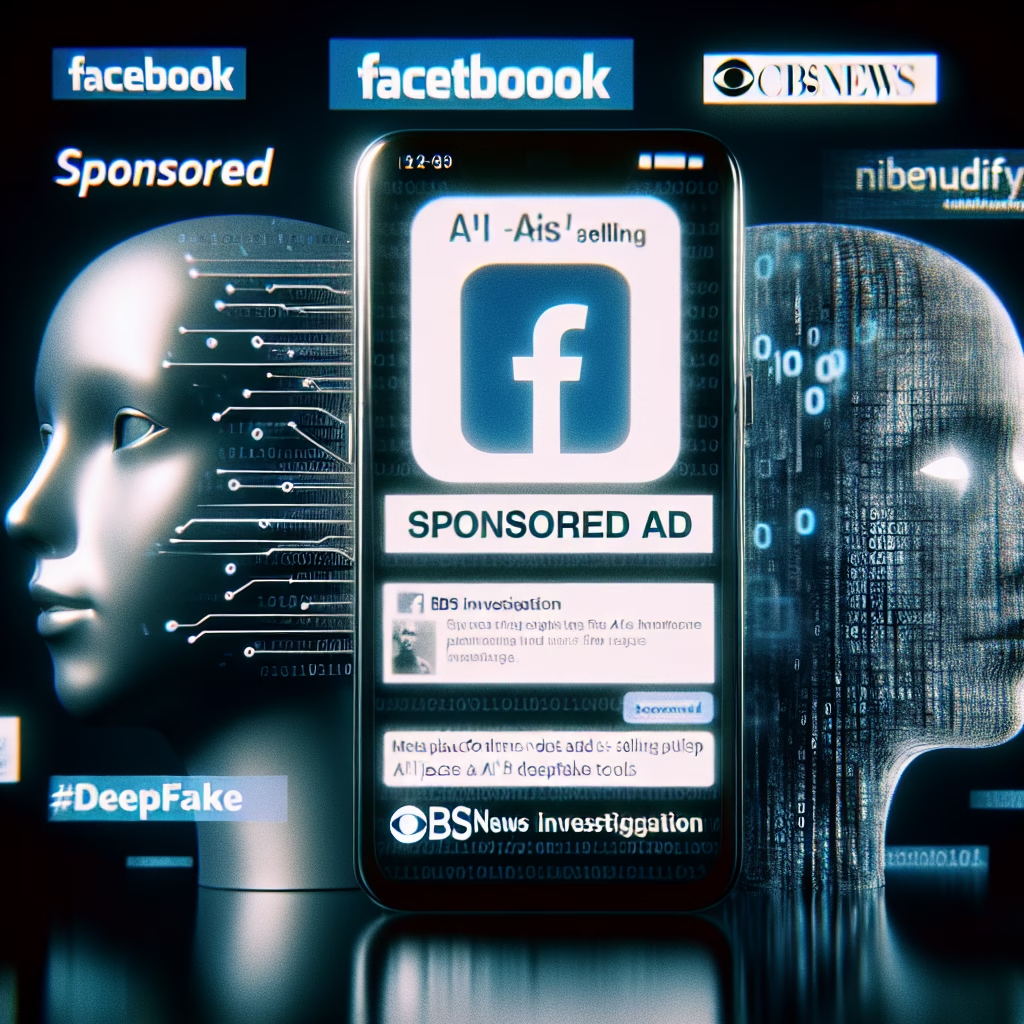Meta Platforms Under Scrutiny for Allowing Ads Promoting AI Deepfake Nudity Tools
Introduction
In an era where artificial intelligence is advancing at breakneck speed, the potential for misuse has become a growing concern. A recent CBS News investigation has uncovered a disturbing trend — companies are using Meta’s advertising platforms, including Instagram and Facebook, to promote AI tools capable of creating deepfake nudity. These AI tools, often disguised as photo enhancement services, are being delivered to millions through Meta’s advertising reach, exposing users — especially women and minors — to severe privacy and ethical risks.
What the Investigation Revealed
According to CBS News, several companies are using Instagram and Facebook to push ads for AI-powered “nudify” tools. These programs use deepfake technology to digitally remove clothing from images, creating sexually explicit renderings of the original photos.
Despite Meta’s stated advertising guidelines, ads for these tools are appearing on their platforms, sometimes even targeting minors. The investigation traced these advertised services back to websites that offered explicit AI-generated content with little to no age verification.
The AI Tools in Question
These are not your typical photo-editing apps. The AI tools promoted in these ads utilize deep learning algorithms to generate hyper-realistic nudes from regular photos — all without the consent of the subject.
Some characteristics of the tools include:
- Image Upload Function: Users are instructed to upload a photo, typically of a woman, who is then rendered nude by the AI software.
- No Age Verification: Users, including minors, are not asked for age confirmation before accessing these services.
- Innocuous Marketing: Ads are typically disguised as harmless photo enhancer or beauty retoucher apps.
Meta’s Advertising Dilemma
Meta maintains that advertising of this nature violates their company policies, which prohibit the promotion of “adult products or services.” However, the sheer volume of these ads slipping through Meta’s review system suggests a weak enforcement or an unreliable moderation process.
Key statements from Meta include:
- Meta disapproved many of the connected ads upon discovery and removed those already running.
- The company claims to be improving their detection mechanisms to tackle such violations.
How Are The Ads Getting Through?
SEO-savvy actors are using deceptive tactics to bypass Meta’s ad review system. Some of these include:
- Coded Language: Descriptions that obscure the true purpose of the tool.
- Impersonating Legitimate Apps: Posing as beauty or body edit apps to mislead both users and Meta’s moderators.
- Redirect Tactics: Links lead to intermediate, seemingly safe websites, before taking users to explicit content.
The Vulnerability of Victims
Women and girls are the primary targets of these AI-driven deepfake tools. Often, the software is used without their knowledge or consent, generating private and deeply violating content. These manipulated images can then be distributed across the internet, tarnishing reputations and leading to long-term mental health consequences.
Victim advocacy groups warn that the rapid expansion of this digital abuse stems from:
- Low costs and ease of access to the AI tools
- Gaps in legal protections and authoritative oversight
- Underage users being exposed to or engaging with adult content
Global Concern Over Deepfake Technology
The use of deepfake technology has evolved from political misinformation to tools of personal exploitation. Governments and tech regulators, particularly in the EU and United States, are beginning to explore legal frameworks to curb the misuse of AI, but progress remains slow.
Some proposed solutions to fight deepfake misuse include:
- AI provenance markers: These use metadata to trace how content is generated and altered.
- Stronger age and ID verification: Ensuring minors are not exposed to adult content.
- Ban on AI-generated pornographic content without consent: Some countries have outlawed AI pornography targeting real people without their explicit permission.
Calls to Action
Human rights organizations are calling on Meta and other major tech platforms to:
- Proactively review and vet ads with AI-enabled moderation tools paired with human oversight.
- Report and take down accounts distributing non-consensual or exploitative content.
- Collaborate with regulators and lawmakers to create appropriate safety nets and user protections.
The Ethical Responsibility of Social Platforms
Tech giants like Meta wield immense influence on the internet, and with that power comes the responsibility to create safe digital spaces. Allowing malicious ads to prosper weakens public trust, especially when victims are being exposed to tools that facilitate non-consensual pornography.
While Meta claims they are taking actions, proactive and transparent prevention is arguably more critical than reactive damage control.
User Safety Above All
Users should feel protected online. Meta and similar platforms must develop robust systems for:
- Ethical AI moderation: Using AI to stop AI-driven harm.
- Community reporting tools: Giving users easy access to flag inappropriate or unethical ads.
- Transparency reports: Providing regular updates on how violations are being addressed and resolved.
Final Thoughts
The internet is no longer just a source of information and entertainment—it’s a mirror of society’s values, intentions, and flaws. As companies continue to leverage AI innovations, ethical oversight must keep pace. Allowing ads that promote tools for non-consensual deepfake pornography not only violates personal privacy but erodes the trust users place in digital platforms.
Meta’s ongoing commitment to moderation needs more than promises—it requires real accountability and immediate change.
Enterprises, users, and regulators alike must align to stop the commodification of deepfakes and protect digital dignity moving forward.
Stay Informed and Stay Safe
As users, being informed about the risks and recognizing red flags in advertisements can be the first step toward shielding yourself and others from these harmful practices. If you encounter questionable ads or services on social media:
- Report It: Use platform tools to flag suspicious or offensive content.
- Don’t Engage: Avoid clicking or interacting with ads promoting AI enhancement or photo editing tools from untrusted sources.
- Educate Others: Share what you know to help create a safer online community.
The future of tech must be safe, responsible, and respectful. Platforms like Meta must lead by example.< lang="en">







Leave a Reply